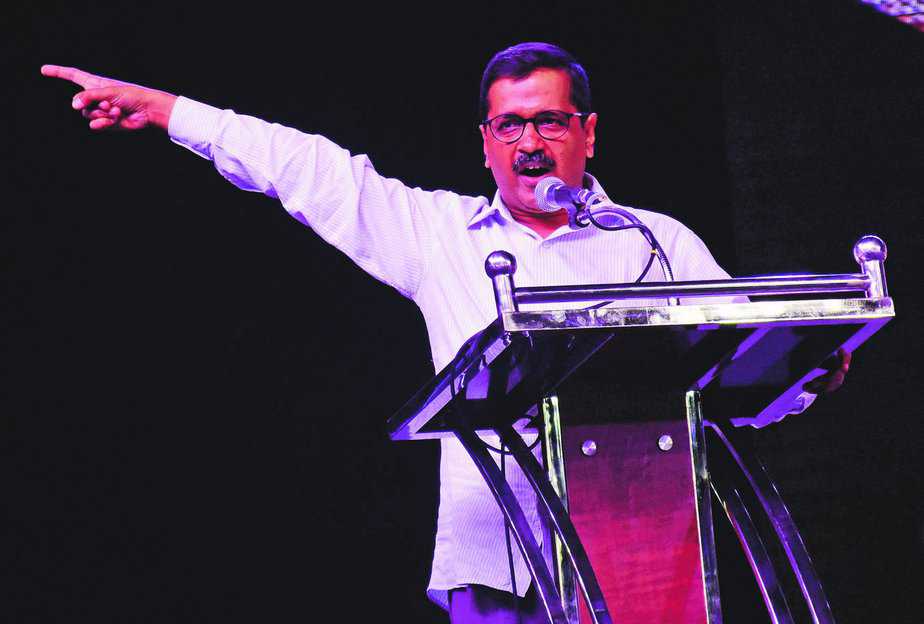
Madurai: Delhi Chief Minister Arvind Kejriwal addressing at the launch of Tamil film icon Kamal Haasan's political party "Makkal Neethi Maiam" in Madurai on Wednesday. PTI Photo(PTI2_21_2018_000238B)
This has to be said about the steel frame: the bureaucracy is a silent force. Its presence is felt when it is not functioning, or protesting, and can easily bring the whole government machinery to a grinding halt. And one such occasion came on February 19, when the Delhi chief secretary, Anshu Prakash, was allegedly assaulted by some of the Aam Aadmi Party (AAP) MLAs; two of them have since been send to jail pending investigation. Prakash was summoned for a midnight emergency meeting at the residence of chief minister Arvind Kejriwal, where the alleged assault happened. Since then, the Delhi government is barely functional, only written communications being used.
Finally after nearly 10 days, the chief secretary Kumar agreed to attend the cabinet meeting with a caveat. He wrote to Kejriwal requesting him to ensure that there is no physical or verbal attack on him. The cabinet meeting took place on Tuesday. The chief minister along with five cabinet colleagues was present, so was Kumar who was accompanied by two senior bureaucrats. The meeting was shorter than usual, punctuated by long silences. There was perceptible tension in the cabinet room. The most distressing aspect was the presence of 15 uniformed guards to deal with any eventuality. It’s sad that now cabinet meetings will have to be guarded as the politicians and the bureaucrats have failed to behave in a parliamentary manner.
The Kejriwal government is under pressure to mend his ways. Delhi’s lieutenant governor Anil Baijal told Kejriwal in plain words that the alleged assault on the chief secretary by AAP MLAs has sent shock waves among all sections of government employees across the country. In a letter to chief minister, Baijal said, “The unfortunate incident of alleged misbehaviour and physical assault on the chief secretary, who is the head of the bureaucracy, at the residence of the chief minister by the elected MLAs, was unprecedented and has had a demoralising effect on the entire bureaucracy.”
Baijal pointed out that government employees feel physically insecure and that he doesn’t recall any precedent so much of a rift between the elected government and bureaucracy. In a statement, the lieutenant governor’s office noted: “From these meetings (met various service associations), the impression he received was that today, government employees in Delhi feel physically insecure, sadly in the very presence of those who have been elected to uphold democracy and rule of law… there was a need to introspect how this deplorable state of affairs has developed.”
This statement was apropos to the request made by deputy chief minister Manish Sisodia to Baijal for ordering bureaucrats to resume work while asserting, in a veiled attack, that if services matter were under the Delhi government’s ambit, “rule of law” would have been followed. Or in simpler words, because the bureaucracy is responsible and reporting to the lieutenant governor, and not to the elected government, this problem has arisen.
Baijal on his part maintained in his reply to Sisodia that “greater responsibility” is on Kejriwal to “reach out directly to the employees.” Baijal clarified that he’s not part of the dispute, as the alleged assault on Prakash was reported to have happened at his residence in his presence, despite, he clarified, there’s “no strike by any section of bureaucracy”.
There is no doubt that the complex nature of Delhi — a union territory with a legislature — and multiplicity of agencies under the control of the government of India, or the Delhi government or the three municipalities has made administration of Delhi complicated. Former chief minister of Delhi for 15 years, Sheila Dikshit, a political heavyweight in the Congress party which was in power at the Centre for good part of her tenure, used to say, “I run Delhi on goodwill.” There is a crisis of goodwill. And the disputes between political rivals AAP and BJP has vitiated the Delhi administration. The ambiguity about a clear line of control and division of powers only makes matters worse. After all, such issues don’t crop up in other states, simply because the chief minister is undisputedly the chief executive and the governor is merely a ‘nominal head.’
While the politicians are under attack, the bureaucracy is not holier-than-thou. It’s Prime Minister Narendra Modi who has waged war against incompetent bureaucracy and wants to reform the steel frame to deal with the challenges of “New India.” He wants some fundamental changes, to sack officers for incompetence and/or corruption, lateral entry into civil services and technology savvy bureaucracy. For instance, the Department of Personnel and Training had written to all central government departments, states and union territories to ensure submission of Immovable Property Returns (IPRs) by IAS officers working with them by January 31, 2018. And those who failed to do so will be denied vigilance clearances needed for promotions and foreign postings.
In the meantime, under the vigil of security guards, the minister and the bureaucrats of Delhi government have resumed work. However, trust and mutual regard is conspicuous by its absence.
Delhi hosted what organisers describe as the world’s first player auction in golf, launching ‘72…
An elderly woman recalls how her six-year-old granddaughter lay bleeding after a speeding car hit…
Municipal Corporation of Delhi plans a unified policy enabling RWAs to adopt and maintain parks…
A 17-year-old boy allegedly died by suicide after jumping before a moving train at Uttam…
Delhi High Court grants bail to 26-year-old Thar driver accused of mowing down two in…
Two Rohini men arrested for fatally stabbing one person and injuring another during a robbery…